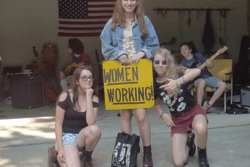How the WASP-iest School in America Taught Me to be a Feminist
“You can’t just throw around loaded terms like ‘feminism.’ You can’t just say, ‘I’m a feminist;’ there are so many implications.”
You must think that someone terribly uninformed said that–an unconsciously misogynistic person who simply isn’t educated enough to know better. But, sadly, you’re wrong. The head of school at my esteemed boarding high school said this during a get-to-know-you gathering on my hall the first week of school this year.
Luckily, or perhaps very sadly, I am used to this misogynistic attitude. My school’s atmosphere is curated for the economically privileged, white male. You can almost smell the privilege. Meticulously manicured green lawns connect high-tech academic buildings and an impressive athletic complex. Boys saunter around dressed for success in blazers and ties while girls are condemned for their never-long-enough Brandy dresses. Socially, the blonde lax boy is praised, with the ‘flow’ as the pinnacle of achievement. And while students flood the stands for boys’ sports games, support for girls is nearly nonexistent.
Clearly, not every guy at my school acts this way. As a community, we’ve begun some discussions on gender issues, dress code, and sexism on campus. But the “bro” and “for the boys” culture is undeniable. I’ve seen the detrimental effects first-hand. Even two years after I started the Feminism Club, the social backlash is still significant. From the student body all the way up to our head of school, the environment is hostile. For example, every time I or another Feminism Club leader announces an upcoming meeting, you can sense the subtle and stinging reactions from the student body. Imagine: the patronizing tones, the snickering, the sly side-glances, the disapproving stares telling me: this is a joke. The uninviting atmosphere has made it difficult to embrace my identity as a feminist, but little by little, I’ve become more confident about voicing my opinions, correcting misinformed judgments, and standing up for my beliefs.
Our head of school’s words struck a deep chord in my feminist self. Sitting in the common room surrounded by girls, I knew they were looking to me—to the leader of the Feminism club—to interject. But I froze. I was dumbfounded. Freshmen, sure, may or may not have heard about feminism (like I once did). I would understand if upperclassmen boys bad-mouthed feminism – they tend to have the need to silence strong women. But our head of school? The first female to hold this position at my school? What kind of example does that set for new girls on campus? Her attitude towards feminism counteracts all of the work the Feminism Club has already done to eliminate the stigma of the word on campus.
I was furious with our head of school’s words, and by my failure to correct her. I kept my mouth shut because that’s what’s been enforced since I began high school. We are told not to question authority or the administration, to put on a happy face for the head of school. What happens, though, when the President and Founder of the Feminism Club, one of the very few members of the community who is brave enough to openly identify as a feminist on campus, falls silent? I let myself down, and I let my fellow feminists down by not speaking up.
I learned a valuable lesson from this experience. Some may deem this moment a complete failure, a cowardly move on my part, but I learned from it. I didn’t speak up because I was scared that, in my anger, I wouldn’t be able to phrase my thoughts correctly, to really get to the root of the problem of my head of school’s comments. I wanted to know why she would say such oblivious things. I didn’t speak up because I’ve always thought that talking accomplishes nothing. If you’re trying to make a difference or change anything at my school, talking with the administration sends you into a dark abyss of long-forgotten email chains, unkept promises, and accomplishes absolutely nothing. But now I realize that the most powerful way to call attention to injustices, generalizations, or misinformed misogyny, is to do exactly that: talk.
After all, you can’t fight the patriarchy with your lips sealed.
This piece was written as part of JWA’s Rising Voices Fellowship.







